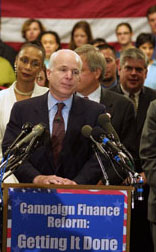 |
|
| 2008 Elections For more information: Inauguration |
|
Campaign Finance Please note: This page has not been updated after the Elections on November 4, to better illustrate the election cycle that lead to the election of President Barack Obama. Running for election to federal office in the United States requires candidates to raise enormous sums of money to finance their campaigns, and the raising and spending of that money is highly regulated by the U.S. government.The offices of president, senator, and representative are federal offices. They constitute the elective members of the White House, the U.S. Senate, and the U.S. House of Representatives in Washington, D.C. The campaigns for election to these offices are regulated by federal law, which also dictates how campaigns may raise funds, from whom, and how much. Federal campaign finance laws are separate from state laws that regulate elections for state and local offices, such as governor, mayor, or member of the state legislature. Accordingly, a candidate for federal office must abide by the federal laws, which are somewhat complex and restrictive. Presidential candidates find it necessary to raise hundreds of millions of dollars for campaigns directed at a nation of more than 100 million voters, but the way in which these candidates raise and spend this money is highly regulated. For more information please see How the 2008 U.S. Elections Will Be Financed from the eJournal The Long Campaign. See also: | |||
|
|||
| Texts are abridged from U.S. State Department IIP publications and
other U.S. government materials. |
|||
| What kind of information
materials are available?
CD: These documents are available in fulltext format on the About the USA CD-ROM. Teachers: Request a copy for classroom use. L: Selected documents are available in German as well as other languages, including Arabic, Chinese, French, Spanish, Persian and Turkish. |
| DISCLAIMER Any reference obtained from this server to a specific commercial product, process, or service does not constitute or imply an endorsement by the United States Government of the product, process, or service, or its producer or provider. The views and opinions expressed in any referenced document do not necessarily state or reflect those of the United States Government. |
 U.S. Diplomatic Mission to Germany /Public Affairs/ Information Resource Centers Updated: March 10, 2009 |
